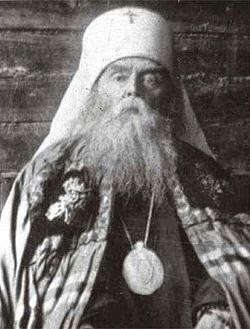Metropolitan Tryphon (1861-1934)
"Oh, how many ideas and works had perished in that building--a whole lost culture? Oh, soot, soot, from the Lubyanka chimneys!"--Aleksandr Solzhenitsyn
In one of his most famous works, The Gulag Archipelago, the Russian author and Nobel Laureate in Literature Aleksandr Solzhenitsyn laments all the great works of human thought and culture that were destroyed by Soviet authorities. The interrogators would burn many of the papers they found on the persons of their prisoners. That was the fate of the Solzhenitsyn's own War Diary. He mentions other such destructions: one man had formulated an alphabet and vocabulary for the Yeniseian languages, and with his work's annihilation came the removal of an entire nationality's written language for decades. Another man was a great engineer, and his papers were taken from his wife and eradicated as well. Solzhenitsyn's lament over the destruction of so much culture.
Along with the destruction of these works came the destruction of men as well, and out of many whose bodies survived, souls were lost. Elie Wiesel, for instance, in Night, writes of the great number of people in German concentration camps who ceased to believe in God because of the horrors they experienced, and he too came close to this utter despair over the Lord. Thankfully, not all lost their faith. Solzhenitsyn recounts the story of one man (whom he chides as having "descended into second childhood") who did his best to keep Easter while imprisoned: he ate only half of his bread rations during the last two weeks of the Fast so that he had seven days of rations with which to feast during Pascha and the first two days of Bright Week, an act which I consider one greatly devoted to God, though few could accomplish it in those conditions.
These two areas of difficulty in the camps of World War II were jointly overcome by Fr. Gregory Petrov. The little that is available in English on his life simply states that he died in a Soviet prison camp in 1940, and among his belongings was rescued the great hymn, "the Akathist of Thanksgiving." It was through being found in his effects that the hymn gained such popularity. Metropolitan Tryphon (born Boris Petrovich Turkestanov) (1861-1934) originally composed it, being inspired by the words, "Glory to God for all things" (Δόξα τῷ Θεῷ πάντων ἕνεκεν). These were the last words of St. John Chrysostom, according to Palladius, and the words Metropolitan Veniamin (Kazanksy) of Petrograd declared at the end of his trial in 1924, during which he was sentenced to be shot. This Akathist is thus a beautiful hymn in its own right, and it gains poignancy by being in a document that survived the Soviets' destruction of culture and was held by a man who kept the Faith. By praying it, may we, too, learn to thank God always, even amidst the greatest sufferings of life. As St. Paul said, Χαίρετε ἐν Κυρίῳ πάντοτε: πάλιν ἐρῶ, χαίρετε, "Rejoice in the Lord always: again I will say, rejoice!" (This was also the favortie Scripture verse of Fr. Alexander Schmemann, a good friend of Solzhenitsyn's, who wrote, "Joy is not one of the 'components' of Christianity, it's the tonality of Christianity that penetrates everything--faith and vision.") Let us, then, pray these joyful words and follow the Prime Apostle's advice: Rejoice in the Lord always!
The late British Orthodox composer John Tavener (1944-2013) set the English text of the Akathist (with a few phrases of Church Slavonic) to dense music, drawing heavily from the Greek and Russian chant traditions. Extracts can be heard at Music Sales Classical.
Nota Bene: The quotes from and references to Aleksandr Solzhenitsyn are from his The Gulag Archipelago 1918-1956: An Experiment in Literary Investigation, Volume I, translated by Thomas P. Whitney (New York, NY: Harper & Row, Publishers, Inc., 1974). The opening quote is from Part I, Chapter 3, as is the story of Solzhenitsyn's War Diary; the stories of other destroyed works are from Part I, Chapter 1; and the story of the man who fasted in prison is from Part I, Chapter 6. Information about the origin of the Akathist and about Metropolitan Tryphon's life come from this thread at OrthodoxChristianity.net. Information about St. John Chrysostom's death comes from the Catholic Encyclopedia at Kevin Knight's New Advent. The quote from Fr. Schmemann comes from The Journals of Father Alexander Schmemann 1973-1983, translated by Juliana Schmemann (Crestwood, NY: St. Vladimir's Seminary Press, 2000), the entry from Friday, 12/03/1976.
Text ©2014 Brandon P. Otto. Licensed via CC BY-NC. Feel free to redistribute non-commercially, as long as credit is given to the author.


No comments:
Post a Comment